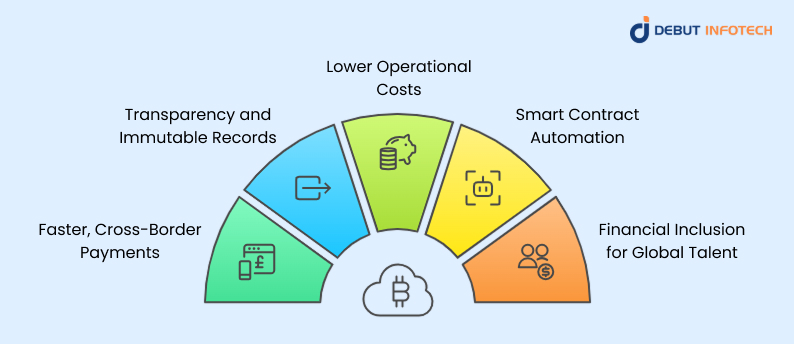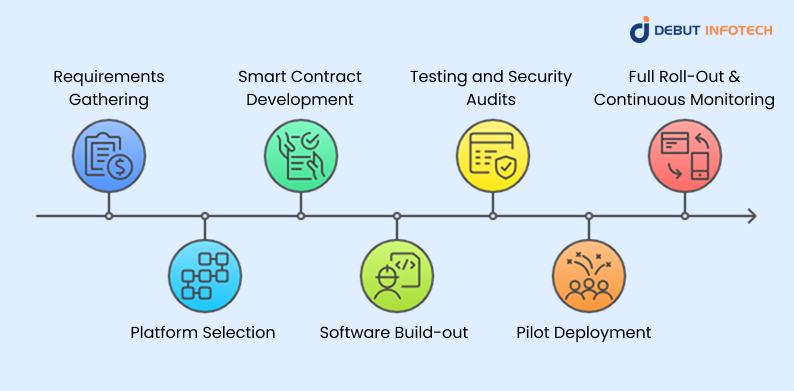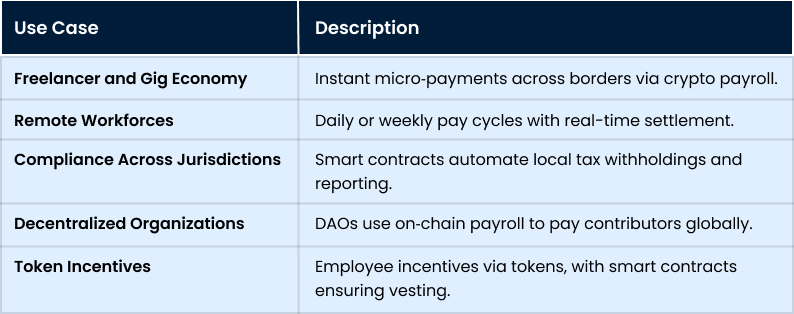Table of Contents
Home / Blog / Blockchain
How Blockchain in Payroll Is Transforming Global Team Payments
June 18, 2025

June 18, 2025
The use of blockchain in payroll has been unveiled as a game‑changer in companies that employ a global team, as it provides a faster, more secure and transparent payment process. With the immutable ledgers and automation of smart contracts, businesses can simplify payroll runs, paying minimal fees, with minimal errors or compliance risks.
Solving the problem of cross-border crypto payrolls or the ability to integrate blockchain payroll software with HR systems are new efficiencies and trust enabled by this revolution. This guide will cover the functionality of blockchain payroll solutions, the advantages of using them, the technical aspects to consider, real-life examples of blockchain use cases, and what teams need to consider when implementing them.
Build Custom Blockchain Payroll Software
Want to create a secure, scalable crypto payroll system? Our experts can help you design and deploy blockchain payroll solutions tailored to your team’s needs.
The Rise of Crypto and Blockchain Payroll
What Is Crypto Payroll?
Crypto payroll is a compensation practice in which employees get some or all of their pay in digital assets like Bitcoin or Ethereum, or stablecoins like USDC. Such an approach is particularly attractive to remote-first organizations, independent contractors, and blockchain-native teams that work internationally. Crypto payroll has the potential to provide near-instant payments, low or no fees, and more autonomy to recipients, unlike conventional payroll systems, which are limited to centralized banking networks.
Due to the increase in the popularity of decentralized finance, numerous startup companies and progressive businesses are turning to crypto payroll systems to avoid the currency exchange problem, banking constraints, and expensive remittance fees. It is especially effective in emerging economies where access to trustworthy banking facilities is limited. Employees can now freely choose to cash out their digital earnings into local fiat, put it in DeFi protocols, or utilize it directly with crypto-powered payment ports.
Defining Blockchain Payroll Solutions
Blockchain payroll solutions take this concept a step further by integrating distributed ledger technology (DLT) into the entire payroll process. Rather than simply paying employees in crypto, blockchain payroll systems enable transparent, automated, and immutable execution of salary disbursements using smart contracts. These contracts are pre-programmed with payment terms, tax rules, and compliance triggers, ensuring seamless payroll execution without manual intervention.
Using blockchain, every payroll transaction is recorded on a secure, tamper-proof ledger, offering real-time auditability for employers and regulators. Businesses can configure smart contracts to disburse wages on specific dates, calculate deductions, or pay bonuses automatically, without third-party interference. Blockchain payroll solutions can be implemented via third-party blockchain payroll software or developed as custom systems in collaboration with a blockchain development company.
Moreover, as regulatory frameworks mature, blockchain payroll systems can be designed to meet evolving compliance requirements, including Know Your Customer (KYC), Anti-Money Laundering (AML), and tax reporting standards. The shift to blockchain-based payroll is not just a trend—it represents a foundational change in how compensation can be managed in a transparent, programmable, and borderless world.
Why Companies Are Turning to Blockchain in Payroll

The adoption of blockchain in payroll is accelerating as more companies realize the inefficiencies of traditional payroll systems, especially in the age of global, remote-first teams. By integrating blockchain technology into payroll operations, businesses are unlocking new speed, transparency, and financial inclusivity levels. Below are key reasons why forward-thinking enterprises are shifting toward blockchain payroll systems:
1. Faster, Cross-Border Payments
Global teams face frequent delays and banking constraints when receiving international payments. Traditional payroll solutions often require multiple intermediaries and several business days to clear international wage transfers. Blockchain payroll removes these barriers by enabling real-time, borderless transactions via decentralized networks.
With smart contract execution and peer-to-peer digital currency transfer, employees can receive compensation in seconds, regardless of their location. This is especially impactful for freelancers and contractors working across various time zones, empowering companies to pay without delays or inflated wire transfer fees.
2. Transparency and Immutable Records
In a decentralized payroll system, every transaction is cryptographically signed and permanently recorded on a distributed ledger. This provides complete visibility for both employers and employees. With blockchain payroll, salary records, deductions, bonuses, and tax information become tamper-proof and traceable, making it much easier to handle audits, resolve disputes, and meet regulatory compliance.
Remote workers and global teams benefit from knowing that their payments are transparent, verifiable, and secure. This builds trust in employer relationships and ensures financial accountability, without needing to rely on centralized third-party processors.
3. Lower Operational Costs
Processing payroll through banks and financial institutions comes with a long list of fees—currency conversion charges, remittance costs, intermediary bank fees, and more. Crypto payroll drastically reduces these costs by eliminating third-party layers and allowing companies to send funds directly to employee wallets using stablecoins or native tokens.
This cost-efficiency becomes especially important for startups, small businesses, or companies that frequently handle international contracts. By integrating blockchain payroll software or working with a blockchain development company, businesses can streamline operations while achieving long-term financial savings.
4. Smart Contract Automation
Manual payroll processes are prone to errors and require extensive human oversight. Blockchain-based smart contracts solve this by automating the entire payment cycle. Terms such as payment schedules, bonus disbursement, taxes, and compliance deductions can all be encoded into smart contracts that execute without human intervention.
Smart contracts ensure consistent, timely, and rule-based payroll actions, minimizing the risk of late payments, incorrect calculations, or missed bonuses. This automation also supports scalability as your team grows across countries and currencies.
5. Financial Inclusion for Global Talent
A significant number of skilled professionals around the world live in underbanked or unbanked regions, lacking access to reliable financial infrastructure. Blockchain in payroll enables these individuals to receive income through multicurrency wallets, trc20 wallets, or other decentralized platforms without needing a traditional bank account.
For companies, this opens up access to a broader talent pool, while empowering employees to control their earnings, participate in DeFi protocols, or use their income in asset backed crypto currencies. As global work becomes more decentralized, so too must our payroll systems. Blockchain provides the perfect infrastructure to support this transformation.
Technical Foundations of Blockchain Payroll
Blockchain Platforms and Ledger Protocols
Payroll solutions can leverage public blockchains like Ethereum or permissioned networks tailored for enterprise blockchain development needs. Platforms such as Hyperledger Fabric offer privacy controls and regulatory compatibility ideal for workplace ledger solutions.
Smart Contracts and Payment Logic
Smart contracts are essential: they include employee pay rates, schedules, tax rules, and deductions. Once deployed, they execute on schedule without oversight, streamlining tasks like payroll taxes and benefits.
Integration and HR Systems
Effective blockchain integration involves connecting public or private chains to legacy HR and ERP systems. This requires middleware, secure key management, and on‑chain/off‑chain data synchronization for role tracking, time logs, and compliance records.
Implementation Steps For Blockchain Payroll

- Requirements Gathering: Define payroll rules: salary frequency, time zones, taxes, and compliance standards.
- Platform Selection: Choose blockchain platforms based on factors like privacy needs, cost, and integration capabilities.
- Smart Contract Development: Write and audit contracts for automated salary distribution, including tax/benefit logic.
- Software Build-out: Develop a user interface for payroll administrators and incorporate wallet systems for recipients.
- Testing and Security Audits: Perform thorough testing, simulate edge cases, and conduct audits to prevent vulnerabilities.
- Pilot Deployment: Trial with a small employee group to validate processing, reconciliation, and user experience.
- Full Roll-Out & Continuous Monitoring: Monitor transactions, enforce compliance, and manage system updates as payroll needs evolve.
Emerging Use Cases for Blockchain Payroll
Blockchain payroll is evolving beyond basic crypto payments, with companies now using it for automating taxes, managing freelancer payouts, and enabling real-time compensation.

The Role of Blockchain Consultants & Enterprise Development
When launching a venture into blockchain business development, partnering with experienced blockchain consultants is essential. These experts guide architecture, compliance, tokenomics, and integration. An established blockchain development company can also provide custom payroll modules, audit services, integration, and scaling support, significantly reducing risks and accelerations.
Cost Considerations for Blockchain Payroll
Key cost drivers include:
- Blockchain Development Cost: Smart contract coding and auditing require specialist skills.
- Platform Fees: Public networks charge gas fees, while private chains have upkeep costs.
- Integration and Support: Middleware, HR systems, and wallet infrastructure require investment.
- Compliance Audits: Legal reviews and payroll audits incur ongoing costs.
These expenses should be weighed against the long‑term savings from faster processing, lower fees, and automation.
Real-World Adoption: Case Studies
As blockchain in payroll gains traction, several forward-thinking organizations are putting theory into practice, showcasing how decentralized solutions can revolutionize compensation systems worldwide.
1. Global Tech Firms Embrace Crypto Payroll for Contractors: Major tech firms operating with distributed global teams are piloting hourly crypto payroll models to pay freelance and contractual staff. These solutions help minimize bank transfer lags, especially across time zones and jurisdictions, and significantly reduce transaction fees. These companies use blockchain payroll software to automate real-time payments directly into employees’ crypto wallets, improving cash flow and work satisfaction among gig workers.
2. Blockchain Startups Integrate Tokenized Payroll: Blockchain-native startups are going further by implementing token-based payroll systems. These payments often include vesting smart contracts, ensuring fair distribution over time and boosting employee retention. Many such companies partner with a DeFi staking platform development company to enable team members to stake a portion of their salary, earning passive rewards while contributing to the project’s liquidity. This reflects a strong integration between compensation and ecosystem growth.
3. International NGOs Use Stablecoins for Local Impact: NGOs and aid organizations have started experimenting with stablecoin payroll solutions in countries facing currency volatility or hyperinflation. By paying field workers in stablecoins like USDC or USDT, organizations ensure value preservation and reduce reliance on unstable local banking systems. This not only speeds up disbursement but also increases financial inclusion for individuals without access to traditional financial infrastructure.
Best Practices for Implementing Blockchain Payroll
- Establish governance for private blockchain networks, including node maintenance and access controls.
- Automate AML and KYC steps within payroll dashboards to ensure compliance.
- Collaborate with legal advisors to map payroll against tax and labor laws.
- Provide user-friendly wallet support and fiat conversion guidance.
- Monitor smart contracts and update for legal or compensation changes.
Challenges to Overcome
Enterprises exploring blockchain payroll should be aware of potential obstacles:
- Regulatory Compliance: Must follow multi-jurisdictional tax and employment laws.
- Volatility: Cryptocurrency fluctuations may necessitate refunds or hedging.
- User Adoption: Employees need onboarding on digital wallets and safe key management.
- Security Risks: Guarding against smart contract bugs and key theft is critical.
Despite these, the ROI is compelling, especially for forward-thinking companies with global operations.
The Future of Blockchain Payroll
As blockchain ecosystems continue to mature and expand, the landscape of payroll processing is poised for transformational change. Expect the following key trends to shape the future of how companies compensate their teams:
Tokenized Salaries: Salaries may soon be paid partly in stablecoins, utility tokens, or even asset-backed cryptocurrencies, giving employees flexibility in how they hold, spend, or invest their earnings. This model appeals especially to blockchain-native teams and employees interested in crypto assets as part of their compensation portfolio.
DeFi Integration: With the rise of DeFi development services, employees could earn interest or rewards by directly staking a portion of their salaries. Payroll could integrate with DeFi protocols for yield generation, allowing automated savings or investment flows from each paycheck. This adds a wealth-building dimension to routine salary payments.
Cross-Platform Payroll Tools: Future payroll systems will likely connect seamlessly across wallets, HR platforms, ERP systems, and tax compliance modules using blockchain. Unified dashboards will give employers and employees real-time visibility into salaries, benefits, and compliance metrics, enhancing trust and reducing administrative burdens.
Standards & Interoperability: Developing blockchain ecosystem protocols will make working together easier for different platforms. As payroll systems span multiple chains, establishing standards for identity verification, payment execution, and compliance will be critical to ensure smooth cross-platform functionality.
Encryption & Privacy: Despite blockchain’s transparency, the future of payroll will require hybrid models that preserve employee data privacy. Encryption layers and zero-knowledge proofs may play a major role in securing sensitive salary records while enabling auditable compliance.
Modernize Your Payroll with Blockchain
Simplify international payroll, reduce transaction costs, and ensure faster settlements with our blockchain payroll integration services.
Conclusion
Blockchain in payroll redefines payroll processing for today’s global, fast-moving businesses. By leveraging immutable ledgers, smart contracts, and secure integrations, organizations can deliver on-time, cost-effective, and transparent payments to team members worldwide. The benefits—reduced friction, lower fees, automation, and new financial paradigms—are too compelling to ignore.
However, success requires careful compliance, volatility, security, and readiness planning. By partnering with experienced blockchain consultants or a leading blockchain development company, businesses can build scalable, secure, and compliant blockchain payroll software suited for tomorrow’s global workforce.
Frequently Asked Questions
Q. What is blockchain payroll and how does it work?
A. Blockchain payroll refers to using blockchain technology to process and manage employee compensation. It leverages smart contracts and distributed ledgers to automate payroll execution, store payment records securely, and enable real-time, cross-border salary disbursements, often in cryptocurrency. This system increases transparency, reduces costs, and minimizes errors compared to traditional payroll methods.
Q. What are the benefits of using crypto payroll for global teams?
A. Crypto payroll allows companies to pay employees in digital currencies like Bitcoin or stablecoins. The main benefits include faster transactions, reduced banking fees, easy international payments, and financial inclusion for underbanked employees. It’s especially beneficial for remote and decentralized teams.
Q. Can blockchain payroll software integrate with existing HR systems?
A. Yes, modern blockchain payroll software is designed to integrate with existing HR, ERP, and accounting systems. This is achieved through APIs and middleware that sync employee data, pay cycles, and compliance checks. Seamless blockchain integration ensures that businesses don’t have to rebuild their payroll process from scratch.
Q. What are the common challenges with payroll blockchain solutions?
A. While blockchain-based payroll offers many benefits, there are still Machine Learning Challenges like regulatory uncertainty, cryptocurrency volatility, tax reporting complexities, and user adoption barriers. Businesses must also invest in security audits and employee education to successfully transition to a blockchain-enabled system.
Q. How much does blockchain payroll implementation cost?
A. The cost of blockchain development depends on the scope of the project. Factors include the choice of blockchain platforms, smart contract complexity, required integrations, user interface design, and ongoing compliance updates. Partnering with an experienced blockchain development company helps optimize costs and ensure regulatory adherence.
Q. What industries are adopting blockchain in payroll?
A. Industries with global or remote teams—such as tech startups, crypto companies, and freelancing platforms—are early adopters of blockchain payroll. NGOs and companies in developing regions also use it to ensure reliable payments. Moreover, firms exploring blockchain business development or DeFi are often the first to implement such solutions.
Q. Is blockchain payroll legal and compliant with tax regulations?
A. The legality of blockchain in payroll depends on the jurisdiction. In many countries, crypto salaries are allowed but must follow income tax and employment laws. Businesses need legal guidance to comply with wage reporting, withholding taxes, and financial disclosures. Working with blockchain consultants can help ensure compliance from the start.
Talk With Our Expert
Our Latest Insights
USA
Debut Infotech Global Services LLC
2102 Linden LN, Palatine, IL 60067
+1-708-515-4004
info@debutinfotech.com
UK
Debut Infotech Pvt Ltd
7 Pound Close, Yarnton, Oxfordshire, OX51QG
+44-770-304-0079
info@debutinfotech.com
Canada
Debut Infotech Pvt Ltd
326 Parkvale Drive, Kitchener, ON N2R1Y7
+1-708-515-4004
info@debutinfotech.com
INDIA
Debut Infotech Pvt Ltd
Sector 101-A, Plot No: I-42, IT City Rd, JLPL Industrial Area, Mohali, PB 140306
9888402396
info@debutinfotech.com



Leave a Comment